96 start with E start with E
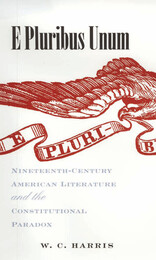
The project of E Pluribus Unum is twofold. Its first and underlying concern is the general philosophic problem of the one and the many as it came to be understood at the time. W. C. Harris supplies a detailed account of the genealogy of the concept, exploring both its applications and its paradoxes as a basis for state and identity formation.
Harris then considers the perilous integration of the one and the many as a motive in the major literary accomplishments of 19th-century U.S. writers. Drawing upon critical as well as historical resources and upon contexts as diverse as cosmology, epistemology, poetics, politics, and Bible translation, he discusses attempts by Poe, Whitman, Melville, and William James to resolve the problems of social construction caused by the paradox of e pluribus unum by writing literary and philosophical texts that supplement the nation’s political founding documents.
Poe (Eureka), Whitman (Leaves of Grass), Melville (Billy Budd), and William James (The Varieties of Religious Experience) provide their own distinct, sometimes contradictory resolutions to the conflicting demands of diversity and unity, equality and hierarchy. Each of these texts understands literary and philosophical writing as having the potential to transform-conceptually or actually-the construction of social order.
This work will be of great interest to literary and constitutional scholars.
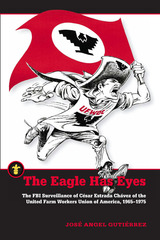
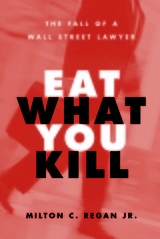
-Nancy Rapoport, University of Houston Law Center
"Eat What You Kill is gripping and well written. . . . It weaves in academic commentary and understanding of professional ethics issues in a way that makes it accessible to everyone."
-Frank Partnoy, University of San Diego Law School
He had it all, and then he lost it. But why did he do it, risking everything-wealth, success, livelihood, freedom, and the security of family?
Eat What You Kill is the story of John Gellene, a rising star and bankruptcy partner at one of Wall Street's most venerable law firms. But when Gellene became entangled in a web of conflicting corporate and legal interests involving one of his clients, he was eventually charged with making false statements, indicted, found guilty of a federal crime, and sentenced to prison.
Milton C. Regan Jr. uses Gellene's case to prove that such conflicting interests are now disturbingly commonplace in the world of American corporate finance. Combining a journalist's eye with sharp psychological insight, Regan spins Gellene's story into a gripping drama of fundamental tensions in modern-day corporate practice and describes in perfect miniature the inexorable confluence of the interests of American corporations and their legal counselors.
This confluence may seem natural enough, but because these law firms serve many masters-corporations, venture capitalists, shareholder groups-it has paradoxically led to deep, pervasive conflicts of interest. Eat What You Kill gives us the story of a man trapped in this labyrinth, and reveals the individual and systemic factors that contributed to Gellene's demise.
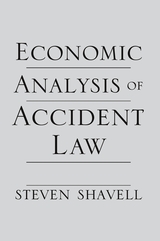
“[This] is certainly a masterpiece.”—Thomas S. Ulen, Journal of Economic Literature
“The strength of Shavell’s book is its lucid, structured development and explication of the economic model. It represents the best systematic presentation of the relevance of economic argument for issues of risk allocation.”—Jules L. Coleman, Yale Law Journal
“Steven Shavell…[has] drawn upon [his] previous path-breaking work to issue [one of] the most important books in the law and economics of tort law since the release in 1970 of Guido Calabresi’s The Costs of Accidents…The work is a masterful tribute to the power of economic modelling and the use of optimization techniques…I, for one, was immensely impressed by the richness of the insights that Shavell’s theoretical approach provided into the fundamental issues of tort law.”—John J. Donohue III, Harvard Law Review
Accident law, if properly designed, is capable of reducing the incidence of mishaps by making people act more cautiously. Scholarly writing on this branch of law traditionally has been concerned with examining the law for consistency with felt notions of right and duty. Since the 1960s, however, a group of legal scholars and economists have focused on identifying the effects of accident law on people’s behavior. Steven Shavell’s book is the definitive synthesis of research to date in this new field.
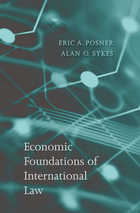
The ever-increasing exchange of goods and ideas among nations, as well as cross-border pollution, global warming, and international crime, pose urgent questions for international law. Here, two respected scholars provide an intellectual framework for assessing these pressing legal problems from a rational choice perspective.
The approach assumes that states are rational, forward-looking agents which use international law to address the actions of other states that may have consequences for their own citizens, and to obtain the benefits of international cooperation. It further assumes that in the absence of a central enforcement agency—that is, a world government—international law must be self-enforcing. States must believe that if they violate international agreements, other states will retaliate.
Consequently, Eric A. Posner and Alan O. Sykes devote considerable attention to the challenges of enforcing international law, which begin with the difficulties of determining what it is. In the absence of an international constitution, the sources for international law are vague. Lawyers must rely on statements contained in all manner of official documents and on simple observation of states’ behavior. This looseness leads international institutions such as the United Nations to deliver conflicting interpretations of the law’s most basic principles. The authors describe the conditions under which international law succeeds or fails, across a wide range of issues, including war crimes, human rights, international criminal law, principles of state responsibility, law of the sea, international trade regulation, and international investment law.
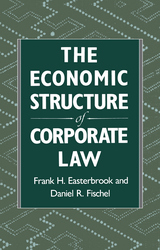
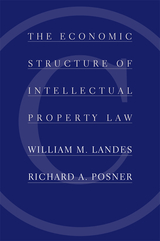
This book takes a fresh look at the most dynamic area of American law today, comprising the fields of copyright, patent, trademark, trade secrecy, publicity rights, and misappropriation. Topics range from copyright in private letters to defensive patenting of business methods, from moral rights in the visual arts to the banking of trademarks, from the impact of the court of patent appeals to the management of Mickey Mouse. The history and political science of intellectual property law, the challenge of digitization, the many statutes and judge-made doctrines, and the interplay with antitrust principles are all examined. The treatment is both positive (oriented toward understanding the law as it is) and normative (oriented to the reform of the law).
Previous analyses have tended to overlook the paradox that expanding intellectual property rights can effectively reduce the amount of new intellectual property by raising the creators' input costs. Those analyses have also failed to integrate the fields of intellectual property law. They have failed as well to integrate intellectual property law with the law of physical property, overlooking the many economic and legal-doctrinal parallels.
This book demonstrates the fundamental economic rationality of intellectual property law, but is sympathetic to critics who believe that in recent decades Congress and the courts have gone too far in the creation and protection of intellectual property rights.
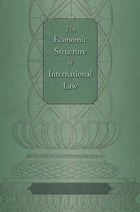
The Economic Structure of International Law presents a rationalist analysis of the structure of international law. It employs social scientific techniques to develop an understanding of the role of law in international society. In doing so, it delves into the question of compliance and reveals the real-world circumstances under which states might adhere to or violate international law.
Joel P. Trachtman explores such topics as treaty-making and jurisdiction; the rise, stability, and efficiency of custom; the establishment of international organizations; and the structure and role of international legal dispute settlement. At the core of the book lies the question of the allocation of legal power to states. The Economic Structure of International Law presents policymakers and scholars with an over-arching analytical model of international law, one that demonstrates the potential of international law, but also explains how policymakers should choose among different international legal structures.

Written by a lawyer and an economist, this is the first full-length economic study of tort law--the body of law that governs liability for accidents and for intentional wrongs such as battery and defamation. Landes and Posner propose that tort law is best understood as a system for achieving an efficient allocation of resources to safety--that, on the whole, rules and doctrines of tort law encourage the optimal investment in safety by potential injurers and potential victims.
The book contains both a comprehensive description of the major doctrines of tort law and a series of formal economic models used to explore the economic properties of these doctrines. All the formal models are translated into simple commonsense terms so that the "math less" reader can follow the text without difficulty; legal jargon is also avoided, for the sake of economists and other readers not trained in the law.
Although the primary focus is on explaining existing doctrines rather than on exploring their implementation by juries, insurance adjusters, and other "real world" actors, the book has obvious pertinence to the ongoing controversies over damage awards, insurance rates and availability, and reform of tort law-in fact it is an essential prerequisite to sound reform. Among other timely topics, the authors discuss punitive damage awards in products liability cases, the evolution of products liability law, and the problem of liability for "mass disaster" torts, such as might be produced by a nuclear accident. More generally, this book is an important contribution to the "law and economics" movement, the most exciting and controversial development in modern legal education and scholarship, and will become an obligatory reference for all who are concerned with the study of tort law.
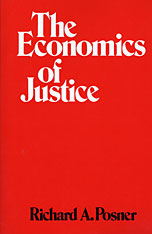
Richard A. Posner is probably the leading scholar in the rapidly growing field of the economics of law; he is also an extremely lucid writer. In this book, he applies economic theory to four areas of interest to students of social and legal institutions: the theory of justice, primitive and ancient social and legal institutions, the law and economics of privacy and reputation, and the law and economics of racial discrimination.
The book is designed to display the power of economics to organize and illuminate diverse fields in the study of nonmarket behavior and institutions. A central theme is the importance of uncertainty to an understanding of social and legal institutions. Another major theme is that the logic of the law, in many ways but not all, appears to be an economic one: that judges, for example, in interpreting the common law, act as if they were trying to maximize economic welfare.
Part I examines the deficiencies of utilitarianism as both a positive and a normative basis of understanding law, ethics, and social institutions, and suggests in its place the economist’s concept of “wealth maximization.”
Part II, an examination of the social and legal institutions of archaic societies, notably that of ancient Greece and primitive societies, argues that economic analysis holds the key to understanding such diverse features of these societies as reciprocal gift-giving, blood guilt, marriage customs, liability rules, and the prestige accorded to generosity. Many topics relevant to modern social and philosophical debate, including the origin of the state and the retributive theory of punishment, are addressed.
Parts III and IV deal with more contemporary social and jurisprudential questions. Part III is an economic analysis of privacy and the statutory and common law rules that protect privacy and related interests—rules that include the tort law of privacy, assault and battery, and defamation. Finally, Part IV examines, again from an economic standpoint, the controversial areas of racial and sexual discrimination, with special reference to affirmative action. Both Part III and Part IV develop as a sub-theme the issue of proper standards of constitutional adjudication by the Supreme Court.
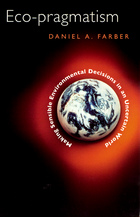
"A comprehensive well-argued effort to address many of the most difficult issues facing legislators concerned with environmental issues."—Stephen P. Adamian, Boston Book Review
"A timely and well-argued contribution."—Calestous Juma, Nature
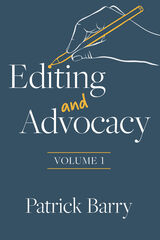
This book— which is based on a popular course taught at the University of Chicago Law School, the University of Michigan Law School, and the UCLA School of Law— is designed to help you become one of those editors. You’ll learn how to edit with empathy. You’ll learn how to edit with statistics. You’ll learn, in short, a wide range of compositional skills you can use to elevate your advocacy and better champion the causes you care about the most.
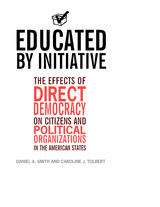
--Kristina Wilfore, Executive Director, Ballot Initiative Strategy Center and Foundation
Educated by Initiative moves beyond previous evaluations of public policy to emphasize the educational importance of the initiative process itself. Since a majority of ballots ultimately fail or get overturned by the courts, Smith and Tolbert suggest that the educational consequences of initiative voting may be more important than the outcomes of the ballots themselves. The result is a fascinating and thoroughly-researched book about how direct democracy teaches citizens about politics, voting, civic engagement and the influence of special interests and political parties. Designed to be accessible to anyone interested in the future of American democracy, the book includes boxes (titled "What Matters") that succinctly summarize the authors' data into easily readable analyses.
Daniel A. Smith is Associate Professor of Political Science at the University of Florida.
Caroline J. Tolbert is Associate Professor of Political Science at Kent State University.
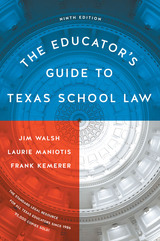
Much has changed in the area of school law since the first edition of The Educator’s Guide was published in 1986. This new ninth edition offers an authoritative source on all major dimensions of Texas school law through the 2017 legislative sessions. Intended for educators, school board members, interested attorneys, and taxpayers, the ninth edition explains what the law is and what the implications are for effective school operations. It is designed to help professional educators avoid expensive and time-consuming lawsuits by taking effective preventive action. It is an especially valuable resource for school law courses and staff development sessions.
The ninth edition begins with a review of the legal structure of the Texas school system, incorporating recent innovative features such as charter schools and districts of innovation. Successive chapters address attendance, the instructional program, service to students with special needs, the rights of public school employees, the role of religion, student discipline, governmental transparency, privacy, parent rights, and the parameters of legal liability for schools and school personnel. The book includes discussion of major federal legislation, such as the Individuals with Disabilities Education Act, the Family Educational Rights and Privacy Act, Section 504 of the Rehabilitation Act of 1973, and the Every Student Succeeds Act. On the state level, the book incorporates new laws pertaining to cyberbullying and inappropriate relationships between students and employees. Key points are illustrated through case law, and a complete index of case citations is included.
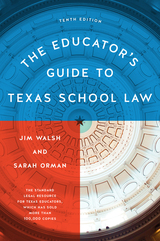
Much has changed in the area of school law since the first edition of The Educator’s Guide to Texas School Law was published in 1986. This new tenth edition of The Educator’s Guide offers an authoritative source on Texas school law through the 2021 legislative sessions. Intended for educators, school board members, attorneys, and taxpayers, it explains what the law is and what the implications are for effective school operations; it helps professional educators avoid expensive and time-consuming lawsuits by taking effective preventive action; and it serves as a highly valuable resource for school law courses and staff development sessions.
The tenth edition begins with a review of the legal structure of the Texas school system, incorporating recent features such as charter schools and districts of innovation, then addresses the instructional program, service to students with special needs, the rights of public school employees, the role of religion, student discipline, governmental transparency, privacy, parental rights, and the parameters of legal liability for schools and school personnel. The book includes discussion of major federal legislation, such as the Individuals with Disabilities Education Act, the Family Educational Rights and Privacy Act, Section 504 of the Rehabilitation Act of 1973, and Title IX. On the state level, the book incorporates laws pertaining to cyberbullying, inappropriate relationships between students and employees, and human sexuality instruction.
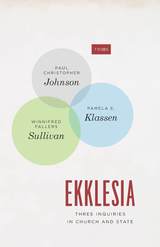
The first of a closely linked trio of essays is by Paul Johnson, and offers a new interpretation of the Brazilian community gathered at Canudos and its massacre in 1896–97, carried out as a joint churchstate mission and spectacle. In the second essay, Pamela Klassen argues that the colonial churchstate relationship of Canada came into being through local and national practices that emerged as Indigenous nations responded to and resisted becoming “possessions” of colonial British America. Finally, Winnifred Sullivan’s essay begins with reflection on the increased effort within the United States to ban Bibles and scriptural references from death penalty courtrooms and jury rooms; she follows with a consideration of the political theological pressure thereby placed on the jury that decides between life and death. Through these three inquiries, Ekklesia takes up the familiar topos of “church and state” in order to render it strange.
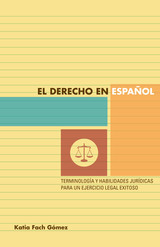
El español es el segundo idioma más hablado en el mundo. Un número creciente de personas en los Estados Unidos y en otros países son conocedores de este idioma y además lo utilizan profesionalmente en el ámbito jurídico. No obstante, a muchos de ellos les gustaría mejorar su comprensión idiomática y jurídica del mismo. En la actualidad existen pocos recursos didácticos y profesionales a los que recurrir. El derecho en español: Terminología y habilidades jurídicas para un ejercicio legal exitoso es el único libro actualmente en el mercado que ofrece al mismo tiempo instrucción avanzada en español jurídico e información selecta sobre los marcos legales contemporáneos en los que este idioma se utiliza.
Este libro monolingüe en español puede ser utilizado en el aula y también como herramienta de auto-aprendizaje por parte de universitarios y profesionales que posean un nivel intermedio de conocimiento del idioma. El libro contiene diez lecciones, cada una de ellas dedicada a un área clave del derecho: constitucional, contratos, actividades bancarias, penal, familia, inmigración, derechos humanos, litigios internacionales y arbitraje. Todas estas lecciones presentan un vocabulario escogido sobre el tema jurídico abordado en ellas, y después ofrecen una serie de ejercicios basados en documentos jurídicos reales procedentes de diversos países de habla hispana. El último capítulo es una guía para facilitar la comprensión de varias películas que contienen interesantes cuestiones legales y que pueden ser utilizadas para el análisis contextual de los temas abordados en las lecciones precedentes. A través de todos estos materiales de capacitación, los lectores aprenderán a utilizar el vocabulario español jurídico en su contexto operativo adecuado, y podrán entender las diferencias lingüísticas y conceptuales entre los distintos países de América Latina y España. Al mismo tiempo se familiarizarán con las disposiciones y los documentos más utilizados en la práctica jurídica en español. Finalmente, también podrán mejorar sus habilidades de escucha y de redacción jurídica.
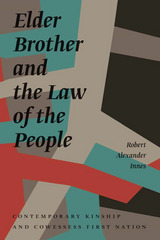


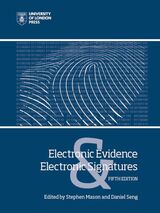
In this updated edition of a well-established practitioner text, Stephen Mason and Daniel Seng have brought together a team of experts in the field to provide an exhaustive treatment of electronic evidence and electronic signatures. This fifth edition continues to follow the tradition in English evidence textbooks by basing the text on the law of England and Wales, with appropriate citations of relevant case law and legislation from other jurisdictions.


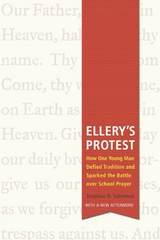
“Solomon’s fascinating and sweeping history of the legal fight over mandatory school prayers is compelling, judicious, and elegantly written. Fabulous!”
—David Rudenstine, Dean, Benjamin N. Cardozo School of Law, Yeshiva University
“Stephen Solomon’s Ellery’s Protest provides a brilliant analysis of a major Supreme Court decision that redefined the relationship between church and state almost a half century ago. This study goes well beyond simply offering a gripping account of the course of litigation that brought before the Justices the contentious issue of prayer and Bible reading in public schools, though the thoroughness of that account would merit careful reading by itself. Especially impressive is the author’s deep probing of hitherto neglected sources, and invaluable primary material including extensive direct contact with the plaintiff, the ‘Ellery’ of the book’s title. Finally, and perhaps most impressive, is Solomon’s careful placement of the issue and the case in a far broader context that is as critical to national life and policy today as it was four and a half decades ago when the high Court first tackled these questions.”
—Robert O’Neil, Professor of Law, University of Virginia
Great legal decisions often result from the heroic actions of average citizens. Ellery’s Protest is the story of how one student’s objection to mandatory school prayer and Bible reading led to one of the most controversial court cases of the twentieth century—and a decision that still reverberates in the battle over the role of religion in public life.
Abington School District v. Schempp began its journey through the nation’s courts in 1956, when sixteen-year-old Ellery Schempp protested his public school’s compulsory prayer and Bible-reading period by reading silently from the Koran. Ejected from class for his actions, Schempp sued the school district. The Supreme Court’s decision in his favor was one of the most important rulings on religious freedom in our nation’s history. It prompted a conservative backlash that continues to this day, in the skirmishes over school prayer, the teaching of creationism and intelligent design, and the recitation of the Pledge of Allegiance with the phrase “under God.”
Author Stephen D. Solomon tells the fascinating personal and legal drama of the Schempp case: the family’s struggle against the ugly reactions of neighbors, and the impassioned courtroom clashes as brilliant lawyers on both sides argued about the meaning of religious freedom. But Schempp was not the only case challenging religious exercises in the schools at the time, and Ellery’s Protest describes the race to the Supreme Court among the attorneys for four such cases, including one involving the colorful atheist Madalyn Murray.
Solomon also explores the political, cultural, and religious roots of the controversy. Contrary to popular belief, liberal justices did not kick God out of the public schools. Bitter conflict over school Bible reading had long divided Protestants and Catholics in the United States. Eventually, it was the American people themselves who removed most religious exercises from public education as a more religiously diverse nation chose tolerance over sectarianism. Ellery’s Protest offers a vivid account of the case that embodied this change, and a reminder that conservative justices of the 1950s and 60s not only signed on to the Schempp decision, but strongly endorsed the separation of church and state.
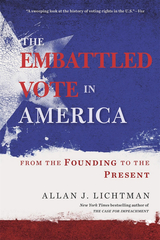
“A sweeping look at the history of voting rights in the U.S.”—Vox
Who has the right to vote? And who benefits from exclusion?
For most of American history, the right to vote has been a privilege restricted by wealth, sex, race, and literacy. Economic qualifications were finally eliminated in the nineteenth century, but the ideal of a white man’s republic persisted long after that. Women and racial minorities had to fight hard and creatively to secure their voice, but voter identification laws, registration requirements, and voter purges continue to prevent millions of American citizens from voting.
An award-winning historian and voting right activist, Allan Lichtman gives us the history behind today’s headlines. He shows that political gerrymandering and outrageous attempts at voter suppression have been a fixture of American democracy—but so have efforts to fight back and ensure that every citizen’s voice be heard.
“Lichtman uses history to contextualize the fix we’re in today. Each party gropes for advantage by fiddling with the franchise… Growing outrage, he thinks, could ignite demands for change. With luck, this fine history might just help to fan the flame.”
—New York Times Book Review
“The great value of Lichtman’s book is the way it puts today’s right-wing voter suppression efforts in their historical setting. He identifies the current push as the third crackdown on African-American voting rights in our history.”
—Michael Tomasky, New York Review of Books
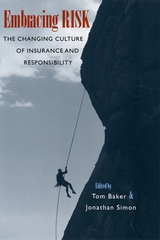
Embracing Risk explores this new approach from a variety of perspectives. The first part of the book focuses on the interplay between risk and insurance in various historical and social contexts. The second part examines how risk is used to govern fields outside the realm of insurance, from extreme sports to policing, mental health institutions, and international law. Offering an original approach to risk, insurance, and responsibility, the provocative and wide-ranging essays in Embracing Risk demonstrate that risk has moved well beyond its origins in the insurance trade to become a central organizing principle of social and cultural life.
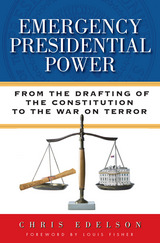
Winner, Crader Family Book Prize in American Values, Department of History and Crader Family Endowment for American Values, Southeast Missouri State University
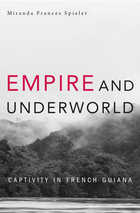
In the century after the French Revolution, the South American outpost of Guiana became a depository for exiles—outcasts of the new French citizenry—and an experimental space for the exercise of new kinds of power and violence against marginal groups. Miranda Spieler chronicles the encounter between colonial officials, planters, and others, ranging from deported political enemies to convicts, ex-convicts, vagabonds, freed slaves, non-European immigrants, and Maroons (descendants of fugitive slaves in the forest). She finds that at a time when France was advocating the revolutionary principles of liberty, equality, and fraternity, Guiana’s exiles were stripped of their legal identities and unmade by law, becoming nonpersons living in limbo.
The French Revolution invented the notion of the citizen, but as Spieler shows, it also invented the noncitizen—the person whose rights were nonexistent. Empire and Underworld discovers in Guiana’s wilderness a haunting prehistory of current moral dilemmas surrounding detainees of indeterminate legal status. Pairing the history of France with that of its underworld and challenging some of the century’s most influential theorists from Hannah Arendt to Michel Foucault, Spieler demonstrates how rights of the modern world can mutate into an apparatus of human deprivation.
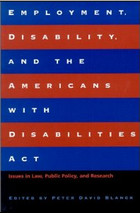
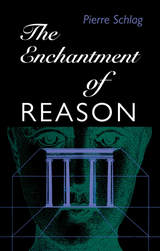
In examining the fierce resistance to questioning reason’s primacy, this renowned critic and professor of American law demonstrates how those who use and study the law perpetuate their own methodological blind spots. Claiming that reason has been endowed with a virtually mystical power to organize social life, Schlag unravels the seemingly rational world of judicial opinions, statutes, doctrines, and legal principles. In the process, he paints a shocking—and sure to be controversial—picture of the chaos and, indeed, violence of the American legal tradition.
This bold commentary on the irrationality of reason in American law and legal studies will interest not only legal scholars and philosophers but also serious thinkers across a broad disciplinary spectrum.

The Trump administration's war on asylum and what Congress and the Biden administration can do about it
Donald Trump’s 2016 campaign centered around immigration issues such as his promise to build a border wall separating the US and Mexico. While he never built a physical wall, he did erect a legal one. Over the past three years, the Trump administration has put forth regulations, policies, and practices all designed to end opportunities for asylum seekers. If left unchecked, these policies will effectually lead to the end of asylum, turning the United States—once a global leader in refugee aid—into a country with one of the most restrictive asylum systems.
In The End of Asylum, three experts in immigration law offer a comprehensive examination of the rise and demise of the US asylum system. Beginning with the Refugee Act of 1980, they describe how Congress adopted a definition of refugee based on the UN Refugee Convention and prescribed equitable and transparent procedures for a uniform asylum process. The authors then chart the evolution of this process, showing how Republican and Democratic administrations and Congresses tweaked the asylum system but maintained it as a means of protecting victims of persecution—until the Trump administration. By expanding his executive reach, twisting obscure provisions in the law, undermining past precedents, and creating additional obstacles for asylum seekers, Trump’s policies have effectively ended asylum. The book concludes with a roadmap and a call to action for the Biden administration and Congress to repair and reform the US asylum system.
This eye-opening work reveals the extent to which the Trump administration has dismantled fundamental American ideals of freedom from persecution and shows us what we can do about it.
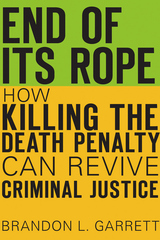
It isn’t enough to celebrate the death penalty’s demise. We must learn from it.
When Henry McCollum was condemned to death in 1984 in rural North Carolina, death sentences were commonplace. In 2014, DNA tests set McCollum free. By then, death sentences were as rare as lethal lightning strikes. To most observers this national trend came as a surprise. What changed? Brandon Garrett hand-collected and analyzed national data, looking for causes and implications of this turnaround. End of Its Rope explains what he found, and why the story of who killed the death penalty, and how, can be the catalyst for criminal justice reform.
No single factor put the death penalty on the road to extinction, Garrett concludes. Death row exonerations fostered rising awareness of errors in death penalty cases, at the same time that a decline in murder rates eroded law-and-order arguments. Defense lawyers radically improved how they litigate death cases when given adequate resources. More troubling, many states replaced the death penalty with what amounts to a virtual death sentence—life without possibility of parole. Today, the death penalty hangs on in a few scattered counties where prosecutors cling to entrenched habits and patterns of racial bias.
The failed death penalty experiment teaches us how inept lawyering, overzealous prosecution, race discrimination, wrongful convictions, and excessive punishments undermine the pursuit of justice. Garrett makes a strong closing case for what a future criminal justice system might look like if these injustices were remedied.
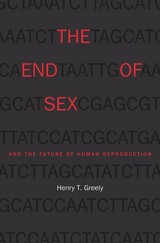
“Will the future confront us with human GMOs? Greely provocatively declares yes, and, while clearly explaining the science, spells out the ethical, political, and practical ramifications.”—Paul Berg, Nobel Laureate and recipient of the National Medal of Science
Within twenty, maybe forty, years most people in developed countries will stop having sex for the purpose of reproduction. Instead, prospective parents will be told as much as they wish to know about the genetic makeup of dozens of embryos, and they will pick one or two for implantation, gestation, and birth. And it will be safe, lawful, and free. In this work of prophetic scholarship, Henry T. Greely explains the revolutionary biological technologies that make this future a seeming inevitability and sets out the deep ethical and legal challenges humanity faces as a result.
“Readers looking for a more in-depth analysis of human genome modifications and reproductive technologies and their legal and ethical implications should strongly consider picking up Greely’s The End of Sex and the Future of Human Reproduction… [It has] the potential to empower readers to make informed decisions about the implementation of advancements in genetics technologies.”
—Dov Greenbaum, Science
“[Greely] provides an extraordinarily sophisticated analysis of the practical, political, legal, and ethical implications of the new world of human reproduction. His book is a model of highly informed, rigorous, thought-provoking speculation about an immensely important topic.”
—Glenn C. Altschuler, Psychology Today
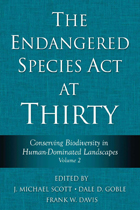
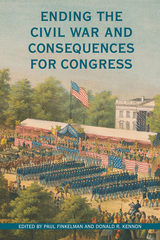
The social changes and human and economic costs of the Civil War led to profound legal and constitutional developments after it ended, not least of which were the Fourteenth and Fifteenth Amendments and the many laws devised to protect the civil rights of newly freed African Americans. These amendments and laws worked for a while, but they were ineffective or ineffectively enforced for more than a century.
In Ending the Civil War and the Consequences for Congress, contributors explore how the end of the war both continued the trauma of the conflict and enhanced the potential for the new birth of freedom that Lincoln promised in the Gettysburg Address. Collectively, they bring their multidisciplinary expertise to bear on the legal, economic, social, and political aspects of the aftermath of the war and Reconstruction era. The book concludes with the reminder of how the meaning of the war has changed over time. The Civil War is no longer the “felt” history it once was, Clay Risen reminds us, and despite the work of many fine scholars it remains contested.
Contributors: Jenny Bourne, Carole Emberton, Paul Finkelman, Lorien Foote, William E. Nelson, Clay Risen, Anne Sarah Rubin, and Peter Wallenstein
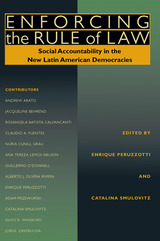
Reports of scandal and corruption have led to the downfall of numerous political leaders in Latin America in recent years. What conditions have developed that allow for the exposure of wrongdoing and the accountability of leaders? Enforcing the Rule of Law examines how elected officials in Latin American democracies have come under scrutiny from new forms of political control, and how these social accountability mechanisms have been successful in counteracting corruption and the limitations of established institutions.
This volume reveals how legal claims, media interventions, civic organizations, citizen committees, electoral observation panels, and other watchdog groups have become effective tools for monitoring political authorities. Their actions have been instrumental in exposing government crime, bringing new issues to the public agenda, and influencing or even reversing policy decisions.
Enforcing the Rule of Law presents compelling accounts of the emergence of civic action movements and their increasing political influence in Latin America, and sheds new light on the state of democracy in the region.
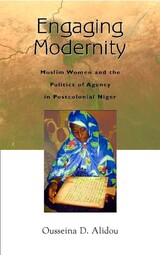
Engaging Modernity is Ousseina Alidou’s rich and compelling portrait of Muslim women in Niger as they confront the challenges and opportunities of the twentieth century. Contrary to Western stereotypes of passive subordination, these women are taking control of their own lives and resisting domination from indigenous traditions, westernization, and Islam alike.
Based on thorough scholarly research and extensive fieldwork—including a wealth of interviews—Alidou’s work offers insights into the meaning of modernity for Muslim women in Niger. Mixing biography with sociological data, social theory and linguistic analysis, this is a multilayered vision of political Islam, education, popular culture, and war and its aftermath. A gripping look at one of the Muslim world’s most powerful untold stories.
Runner-up for the Aidoo-Snyder Book Prize, Women’s Caucus of the African Studies Association
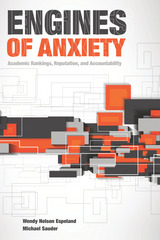
Students and the public routinely consult various published college rankings to assess the quality of colleges and universities and easily compare different schools. However, many institutions have responded to the rankings in ways that benefit neither the schools nor their students. In Engines of Anxiety, sociologists Wendy Espeland and Michael Sauder delve deep into the mechanisms of law school rankings, which have become a top priority within legal education. Based on a wealth of observational data and over 200 in-depth interviews with law students, university deans, and other administrators, they show how the scramble for high rankings has affected the missions and practices of many law schools.
Engines of Anxiety tracks how rankings, such as those published annually by the U.S. News & World Report, permeate every aspect of legal education, beginning with the admissions process. The authors find that prospective law students not only rely heavily on such rankings to evaluate school quality, but also internalize rankings as expressions of their own abilities and flaws. For example, they often view rejections from “first-tier” schools as a sign of personal failure. The rankings also affect the decisions of admissions officers, who try to balance admitting diverse classes with preserving the school’s ranking, which is dependent on factors such as the median LSAT score of the entering class. Espeland and Sauder find that law schools face pressure to admit applicants with high test scores over lower-scoring candidates who possess other favorable credentials.
Engines of Anxiety also reveals how rankings have influenced law schools’ career service departments. Because graduates’ job placements play a major role in the rankings, many institutions have shifted their career-services resources toward tracking placements, and away from counseling and network-building. In turn, law firms regularly use school rankings to recruit and screen job candidates, perpetuating a cycle in which highly ranked schools enjoy increasing prestige. As a result, the rankings create and reinforce a rigid hierarchy that penalizes lower-tier schools that do not conform to the restrictive standards used in the rankings. The authors show that as law schools compete to improve their rankings, their programs become more homogenized and less accessible to non-traditional students.
The ranking system is considered a valuable resource for learning about more than 200 law schools. Yet, Engines of Anxiety shows that the drive to increase a school’s rankings has negative consequences for students, educators, and administrators and has implications for all educational programs that are quantified in similar ways.
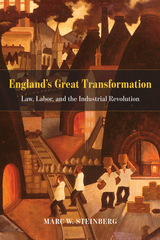
Building his argument on three case studies—the Hanley pottery industry, Hull fisheries, and Redditch needlemakers—Steinberg employs both local and national analyses to emphasize the ways in which these master-servant laws allowed employers to use the criminal prosecutions of workers to maintain control of their labor force. Steinberg provides a fresh perspective on the dynamics of labor control and class power, integrating the complex pathways of Marxism, historical institutionalism, and feminism, and giving readers a subtle yet revelatory new understanding of workplace control and power during England’s Industrial Revolution.
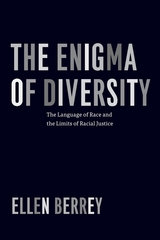
Ellen Berrey digs deep into those questions in The Enigma of Diversity. Drawing on six years of fieldwork and historical sources dating back to the 1950s and making extensive use of three case studies from widely varying arenas—housing redevelopment in Chicago’s Rogers Park neighborhood, affirmative action in the University of Michigan’s admissions program, and the workings of the human resources department at a Fortune 500 company—Berrey explores the complicated, contradictory, and even troubling meanings and uses of diversity as it is invoked by different groups for different, often symbolic ends. In each case, diversity affirms inclusiveness, especially in the most coveted jobs and colleges, yet it resists fundamental change in the practices and cultures that are the foundation of social inequality. Berrey shows how this has led racial progress itself to be reimagined, transformed from a legal fight for fundamental rights to a celebration of the competitive advantages afforded by cultural differences.
Powerfully argued and surprising in its conclusions, The Enigma of Diversity reveals the true cost of the public embrace of diversity: the taming of demands for racial justice.
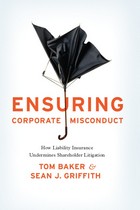
Shareholder litigation and class action suits play a key role in protecting investors and regulating big businesses. But Directors and Officers liability insurance shields corporations and their managers from the financial consequences of many illegal acts, as evidenced by the recent Enron scandal and many of last year’s corporate financial meltdowns. Ensuring Corporate Misconduct demonstrates for the first time how corporations use insurance to avoid responsibility for corporate misconduct, dangerously undermining the impact of securities laws.
As Tom Baker and Sean J. Griffith demonstrate, this need not be the case. Opening up the formerly closed world of corporate insurance, the authors interviewed people from every part of the industry in order to show the different instances where insurance companies could step in and play a constructive role in strengthening corporate governance—yet currently do not. Ensuring Corporate Misconduct concludes with a set of readily implementable reforms that could significantly rehabilitate the system.
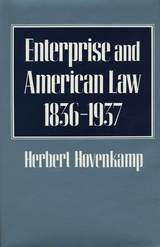
In this integration of law and economic ideas, Herbert Hovenkamp charts the evolution of the legal framework that regulated American business enterprise from the time of Andrew Jackson through the first New Deal. He reveals the interdependent relationship between economic theory and law that existed in these decades of headlong growth and examines how this relationship shaped both the modern business corporation and substantive due process. Classical economic theory—the cluster of ideas about free markets—became the guiding model for the structure and function of both private and public law.
Hovenkamp explores the relationship of classical economic ideas to law in six broad areas related to enterprise in the nineteenth and early twentieth centuries. He traces the development of the early business corporation and maps the rise of regulated industry from the first charter-based utilities to the railroads. He argues that free market political economy provided the intellectual background for constitutional theory and helped define the limits of state and federal regulation of business behavior. The book also illustrates the unique American perspective on political economy reflected in the famous doctrine of substantive due process. Finally, Hovenkamp demonstrates the influence of economic theory on labor law and gives us a reexamination of the antitrust movement, the most explicit intersection of law and economics before the New Deal.
Legal, economic, and intellectual historians and political scientists will welcome these trenchant insights on an influential period in American constitutional and corporate history.
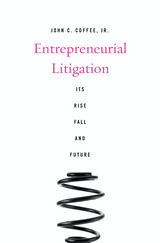
Uniquely in the United States, lawyers litigate large cases on behalf of many claimants who could not afford to sue individually. In these class actions, attorneys act typically as risk-taking entrepreneurs, effectively hiring the client rather than acting as the client’s agent. Lawyer-financed, lawyer-controlled, and lawyer-settled, such entrepreneurial litigation invites lawyers to sometimes act more in their own interest than in the interest of their clients. And because class litigation aggregates many claims, defendants object that its massive scale amounts to legalized extortion. Yet, without such devices as the class action and contingent fees, many meritorious claims would never be asserted.
John Coffee examines the dilemmas surrounding entrepreneurial litigation in a variety of specific contexts, including derivative actions, securities class actions, merger litigation, and mass tort litigation. His concise history traces how practices developed since the early days of the Republic, exploded at the end of the twentieth century, and then waned as Supreme Court decisions and legislation sharply curtailed the reach of entrepreneurial litigation. In an evenhanded account, Coffee assesses both the strengths and weaknesses of entrepreneurial litigation and proposes a number of reforms to achieve a fairer balance. His goal is to save the class action, not discard it, and to make private enforcement of law more democratically accountable. Taking a global perspective, he also considers the feasibility of exporting a modified form of entrepreneurial litigation to other countries that are today seeking a mechanism for aggregate representation.
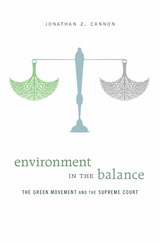
The first Earth Day in 1970 marked environmentalism’s coming-of-age in the United States. More than four decades later, does the green movement remain a transformative force in American life? Presenting a new account from a legal perspective, Environment in the Balance interprets a wide range of U.S. Supreme Court decisions, along with social science research and the literature of the movement, to gauge the practical and cultural impact of environmentalism and its future prospects.
Jonathan Z. Cannon demonstrates that from the 1960s onward, the Court’s rulings on such legal issues as federalism, landowners’ rights, standing, and the scope of regulatory authority have reflected deep-seated cultural differences brought out by the mass movement to protect the environment. In the early years, environmentalists won some important victories, such as the Supreme Court’s 1973 decision allowing them to sue against barriers to recycling. But over time the Court has become more skeptical of their claims and more solicitous of values embodied in private property rights, technological mastery and economic growth, and limited government.
Today, facing the looming threat of global warming, environmentalists struggle to break through a cultural stalemate that threatens their goals. Cannon describes the current ferment in the movement, and chronicles efforts to broaden its cultural appeal while staying connected to its historical roots, and to ideas of nature that have been the source of its distinctive energy and purpose.
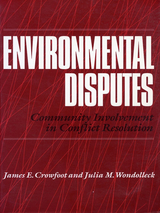

This book explores the use and understanding of law and legal expertise by environmental groups. Rather than focusing on the courtroom, however, this volume scrutinizes environmental NGO advocacy during the extraordinarily dramatic Brexit process, from the referendum on leaving the EU in 2016 to the debate around the new Environment Bill in 2020. In an effort to show how legal expertise is more than a campaign tool or the threat of litigation, this book describes the ways in which law can provide distinctive ways of both seeing and changing the world. Legal resources in the environmental sector are not just a practical limit on what can be done, but an opportunity to investigate the very understanding of what should be done. Legal expertise was heavily and often effectively used in the anomalously law-heavy Brexit-environment debate. This book will clarify this moment and the NGO collaboration that made it possible for environmental advocates to call upon legal expertise in a moment of crisis.

In Environmental Justice, leading thinkers of the environmental justice movement take a direct look at the failure of "top down" public policy to effectively deal with issues of environmental equity.
The book provides a startling look at pressing social and environmental problems and charts a course for future action. Among the topics considered are: the history of the social justice movement the role of the professional in working with community groups methods of dealing with environmental problems at the international level participatory national policy for environmental education, energy, industrial development, and housing and sustainable development.
Contributors include Robert Bullard, Deeohn Ferris, Tom B.K. Goldtooth, David Hahn-Baker, Beverly Wright, Ivette Perfecto, Patrick West, and others.

Environmental Land Use Planning and Management is a unique new textbook that presents a diverse, comprehensive, and coordinated approach to issues of land use planning and management and their impacts on the environment. It builds on recent advances in environmental science, engineering, and geospatial information technologies to provide students with the scientific foundation they need to understand both natural land systems and engineering approaches that can mitigate impacts of land use practices. While offering a base of knowledge in planning theory and natural science, its primary emphasis is on describing and explaining emerging approaches, methods, and techniques for environmental land use planning, design, and policy.
The book is divided into two parts. Part I, "Environmental Land Use Management," introduces broad concepts of environmental planning and describes management approaches. Those approaches include collaborative environmental management, land conservation, environmental design, government land use management, natural hazard mitigation, and ecosystem and watershed management. Part II, "Environmental Land Use Principles and Planning Analysis," focuses on land analysis methods, such as geospatial data and geographic information systems (GIS); soils and slope analysis; assessment of stormwater quantity and quality; land use and groundwater protection; ecological assessment for vegetation, wetlands, and habitats; and integrated analytical techniques like land suitability analysis, carrying capacity studies, and environmental impact assessment.
Environmental Land Use Planning and Managementoffers a unique interdisciplinary perspective with an emphasis on application. It is an important new text for advanced undergraduate and graduate courses in environmental planning, landscape architecture, geography, environmental studies, and natural resource management, and a valuable resource for professionals and others concerned with issues of environmental planning and land use.

With Environmental Law for Biologists, ecologist and lawyer Tristan Kimbrell bridges this gap in legal knowledge. Complete with a concise introduction to environmental law and an appendix describing the most important federal and international statutes and treaties discussed, the book is divided into four broad parts: laws that focus on individual species, like invasive species policies, the Endangered Species Act, and international treaties such as CITES; laws that focus on land, from federal public lands to agricultural regulations and urban planning; laws that focus on water, such as the Clean Water Act; and laws that focus on air, such as the Clean Air Act and international measures meant to mitigate global climate change. Written for working biologists and students alike, this book will be a catalyst for both more effective policy and enhanced research, offering hope for the manifold frictions between science and the law.
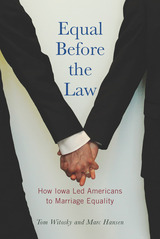
The court’s decision in Varnum v. Brien made Iowa only the third state in the nation to permit same-sex couples to wed—moderate, midwestern Iowa, years before such left-leaning coastal states as California and New York. And unlike the earlier decisions in Massachusetts and Connecticut, Varnum v. Brien was unanimous and unequivocal. It catalyzed the unprecedented and rapid shift in law and public opinion that continues today.
Equal Before the Law tells the stories behind this critical battle in the fight for marriage equality and traces the decision’s impact. The struggle began in 1998 with the easy passage of Iowa’s Defense of Marriage Act and took a turn, surprising to many, in 2005, when six ordinary Iowa couples signed on to Lambda Legal’s suit against the law. Their triumph in 2009 sparked a conservative backlash against the supreme court justices, three of whom faced tough retention elections that fall.
Longtime, award-winning reporters Tom Witosky and Marc Hansen talked with and researched dozens of key figures, including opponent Bob Vander Plaats, proponents Janelle Rettig and Sharon Malheiro, attorneys Roger Kuhle, Dennis Johnson, and Camilla Taylor, and politicians Matt McCoy, Mary Lundby, and Tom Vilsack, who had to weigh their careers against their convictions. Justice Mark Cady, who wrote the decision, explains why the court had to rule in favor of the plaintiffs. At the center of the story are the six couples who sacrificed their privacy to demand public respect for their families.
Through these voices, Witosky and Hansen show that no one should have been surprised by the 2009 decision. Iowans have a long history of leadership on civil rights. Just a year after Iowa became a state, its citizens adopted as their motto the phrase, “Our liberties we prize and our rights we will maintain.” And they still do today.
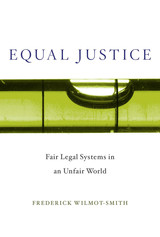
A philosophical and legal argument for equal access to good lawyers and other legal resources.
Should your risk of wrongful conviction depend on your wealth? We wouldn’t dream of passing a law to that effect, but our legal system, which permits the rich to buy the best lawyers, enables wealth to affect legal outcomes. Clearly justice depends not only on the substance of laws but also on the system that administers them.
In Equal Justice, Frederick Wilmot-Smith offers an account of a topic neglected in theory and undermined in practice: justice in legal institutions. He argues that the benefits and burdens of legal systems should be shared equally and that divergences from equality must issue from a fair procedure. He also considers how the ideal of equal justice might be made a reality. Least controversially, legal resources must sometimes be granted to those who cannot afford them. More radically, we may need to rethink the centrality of the market to legal systems. Markets in legal resources entrench pre-existing inequalities, allocate injustice to those without means, and enable the rich to escape the law’s demands. None of this can be justified. Many people think that markets in health care are unjust; it may be time to think of legal services in the same way.
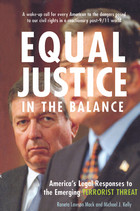
-Michael Ratner, President, Center for Constitutional Rights, from the foreword
"A compelling and sophisticated critique of the U.S. government's post-9/11 actions. Mack and Kelly set the stage with the historical perspective on America's response to terrorism and the assessment of terrorist threats, before launching into a comprehensive analysis of the USA Patriot Act. Their hard-hitting approach and easy-to-read style makes for a fascinating treatment of the government's legislative and executive response to the attacks."
-Michael P. Scharf, Case Western Reserve University School of Law
With its sweeping critique of the USA Patriot Act and the Bush administration's maneuvers in pursuit of terrorists, Equal Justice in the Balance is a sobering and exacting look at American legal responses to terrorism, both before and after 9/11.
The authors detail wide-ranging and persuasive evidence that American antiterrorism legislation has led to serious infringements of our civil rights. They show us how deviations from our fundamental principles of fairness and justice in times of heightened national anxiety-whether the Red Scare, World War II, or the War on Terrorism-have resulted in overreaction and excess, later requiring apologies and reparations to those victimized by a paranoia-driven justice system.
While terrorist attacks-especially on a large scale and on American soil-damage our national pride and sense of security, the authors offer powerful arguments for why we must allow our judicial infrastructure, imperfect as it is, to respond without undue interference from the politics of anger and vengeance.
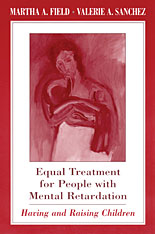
Engaging in sex, becoming parents, raising children: these are among the most personal decisions we make, and for people with mental retardation, these decisions are consistently challenged, regulated, and outlawed. This book is a comprehensive study of the American legal doctrines and social policies, past and present, that have governed procreation and parenting by persons with mental retardation. It argues persuasively that people with retardation should have legal authority to make their own decisions.
Despite the progress of the normalization movement, which has moved so many people with mental retardation into the mainstream since the 1960s, negative myths about reproduction and child rearing among this population persist. Martha Field and Valerie Sanchez trace these prejudices to the eugenics movement of the late nineteenth and early twentieth centuries. They show how misperceptions have led to inconsistent and discriminatory outcomes when third parties seek to make birth control or parenting decisions for people with mental retardation. They also explore the effect of these decisions on those they purport to protect. Detailed, thorough, and just, their book is a sustained argument for reform of the legal practices and social policies it describes.
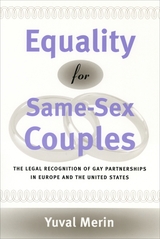
Merin begins by providing a historical overview of the transformation of marriage from antiquity to the present. He then identifies and critically compares four principal models for the legal regulation and recognition of same-sex partnerships: civil marriage, registered partnership, domestic partnership, and cohabitation. Merin concludes that all of the models except civil marriage discriminate against gays and lesbians just as the "separate but equal" doctrine discriminated against African Americans; thus, so-called alternatives to marriage, even if they provide the same rights and benefits as marriage, are inherently unequal and therefore unconstitutional.
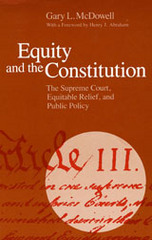
In this volume, Gary McDowell considers the equity power created by Article III of the Constitution, on which the most controversial decisions of the Supreme Court have rested. He points out the equity was originally understood as an extraordinary means of offering relief to individuals in cases of fraud, accident, mistake, or trust and as a means of "confining the operation of unjust and partial laws." It has now been stretched to offer relief to broadly defined social classes. This "sociological" understanding, in McDowell's view, has undermined equity as a substantive body of law. He urges a return to the former definition as a means of restraining the reach of federal jurisdiction.
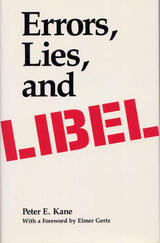
Peter E. Kane takes a critical look at the development of the present law through a discussion of seventeen landmark libel cases.
One of the many points Kane clarifies is the important distinction between an error and a lie when judging whether someone is guilty of libel. For example, in the series of events that led to Goldwater vs. Ginzburg, Ralph Ginzburg, publisher of fact magazine, compiled and printed in fact a montage of quotes he had collected from psychiatrists about Barry Goldwater. It took five years of legal sparring for the courts to conclude that Ginzburg had deliberately published a malicious and irresponsible document and to rule in favor of Goldwater. Kane closes with a discussion of current thinking on possible libel reform.
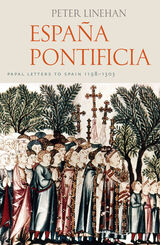
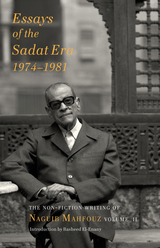
This volume stitches together a fascinating and vivid account of the dramatic events of Sadat’s era, from his break with the Soviet Union to the Yom Kippur War with Israel and eventual peace accord and up to his assassination by Islamic extremists in 1981. Through this tumultuous history, Mahfouz takes on a diverse array of political topics—including socioeconomic stratification, democracy and dictatorship, and Islam and extremism—which are still of crucial relevance to Egypt today. Clear-eyed and direct, the works illuminate Mahfouz’s personal and political convictions that were more often hidden in his novels, enriching his better-known corpus with social, political, and ideological context.
These writings are a rare treasure, a story of a time of tremendous social and political change in the Middle East told by one if its most iconic authors.

"A first-rate prose stylist, [Holmes] was perhaps the most quotable of all judges, as this ably edited volume shows."—Washington Post Book World
"Brilliantly edited, lucidly organized, and equipped with a compelling introduction by Judge Posner, [this book] is one of the finest single-volume samplers of any author's work I have seen. . . . Posner has fully captured the acrid tang of him in this masterly anthology."—Terry Teachout, National Review
"Excellent. . . . A worthwhile contribution to current American political/legal discussions."—Library Journal
"The best source for the reader who wants a first serious acquaintance with Holmes."—Thomas C. Grey, New York Review of Books
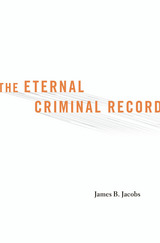
For over sixty million Americans, possessing a criminal record overshadows everything else about their public identity. A rap sheet, or even a court appearance or background report that reveals a run-in with the law, can have fateful consequences for a person’s interactions with just about everyone else. The Eternal Criminal Record makes transparent a pervasive system of police databases and identity screening that has become a routine feature of American life.
The United States is unique in making criminal information easy to obtain by employers, landlords, neighbors, even cyberstalkers. Its nationally integrated rap-sheet system is second to none as an effective law enforcement tool, but it has also facilitated the transfer of ever more sensitive information into the public domain. While there are good reasons for a person’s criminal past to be public knowledge, records of arrests that fail to result in convictions are of questionable benefit. Simply by placing someone under arrest, a police officer has the power to tag a person with a legal history that effectively incriminates him or her for life.
In James Jacobs’s view, law-abiding citizens have a right to know when individuals in their community or workplace represent a potential threat. But convicted persons have rights, too. Jacobs closely examines the problems created by erroneous record keeping, critiques the way the records of individuals who go years without a new conviction are expunged, and proposes strategies for eliminating discrimination based on criminal history, such as certifying the records of those who have demonstrated their rehabilitation.
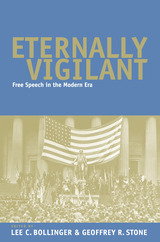
"With group efforts, such as this collection of essays, it is almost inevitable that there will be a couple—and often several—duds among the bunch, or at least a dismaying repetition of ideas. Such is not the case here. . . . Whether one agrees with a given author or not (and it is possible to do both with any of the essays), each has something to add. Overall, Eternally Vigilant is a thoughtful and thought-provoking book, consistently intelligent and, at times, brilliant."—Richard J. Mollot, New York Law Journal
Contributors:
Lillian R. BeVier
Vincent Blasi
Lee C. Bollinger
Stanley Fish
Owen M. Fiss
R. Kent Greenawalt
Richard A. Posner
Robert C. Post
Frederick Schauer
Geoffrey R. Stone
David A. Strauss
Cass R. Sunstein

Piderit explores the failures of mainstream economics and proposes an alternative grounded in natural law. His assessment is grounded in the Christian higher law tradition which assumes that objective standards known to human reason should govern society and individuals.
This book demonstrates both the reasonableness of a distinguished ethical tradition and its capacity to address a wide range of ethical issues, economic as well as personal and social. Piderit emphasizes that natural law theory underlies the U.S. Constitution and informs Catholic, Protestant, and Jewish worship today.
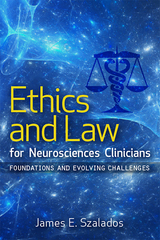

Social marketing is being adopted by a growing number of government and nonprofit organizations around the world because of its power to bring about important social changes. An array of commercial marketing concepts and techniques has been applied to problems ranging from child abuse to teen smoking to environmental neglect. However, in crafting these programs, agencies face complex ethical challenges. For example, is it acceptable to exaggerate risk and heighten fear if doing so saves more lives? What if improving the lives of one group has negative effects on another? How does a marketing campaign respect a group's culture while calling for fundamental change within it?
In Ethics in Social Marketing, ten contributors draw on their professional experience and the literature of ethics to set forth a range of problems and offer frameworks for their resolution. They introduce philosophical rules and practical models to guide decision making, and they focus on such complex issues as unintended consequences, ethical marketing alliances, and professional ethical codes. The book not only introduces students to the special moral and ethical burdens of social marketing but also challenges practitioners to address difficult issues that are easily minimized or avoided.

Serving the public interest with integrity requires a moral perspective that can rise above the day-to-day pressures of the job. This book integrates Western philosophy’s most significant ethical theories and merges them with public administration theory to provide public administrators with an explicit moral foundation for ethical decision making.
Ethics in the Public Service reviews moral thought through the ages, from Plato to Rorty, and makes the philosophies of the more difficult thinkers accessible to both students and practitioners. Unifying seemingly disparate ethical positions, including those of Aristotle, Kant, and Mill, the authors defend the idea of objective moral truth and critique subjectivist views, refuting postmodernism and ethical relativism. Using their integrated objective approach, they tackle such dichotomies in public administration theory as bureaucracy vs. democracy, and they also examine a case study in an administrative setting.
Offering a better understanding of moral dilemmas rather than a formula, this book presents scholars and practitioners with a framework that is both objective and flexible, theoretical and practical. This original synthesis provides a comprehensive basis for administrative thought and action.

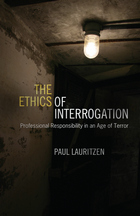
Can harsh interrogation techniques and torture ever be morally justified for a nation at war or under the threat of imminent attack? In the aftermath of the September 11, 2001, terrorist strikes, the United States and other liberal democracies were forced to grapple once again with the issue of balancing national security concerns against the protection of individual civil and political rights. This question was particularly poignant when US forces took prisoners in Afghanistan and Iraq who arguably had information about additional attacks. In this volume, ethicist Paul Lauritzen takes on ethical debates about counterterrorism techniques that are increasingly central to US foreign policy and discusses the ramifications for the future of interrogation.
Lauritzen examines how doctors, lawyers, psychologists, military officers, and other professionals addressed the issue of the appropriate limits in interrogating detainees. In the case of each of these professions, a vigorous debate ensued about whether the interrogation policy developed by the Bush administration violated codes of ethics governing professional practice. These codes are critical, according to Lauritzen, because they provide resources for democracies and professionals seeking to balance concerns about safety with civil liberties, while also shaping the character of those within these professional guilds.
This volume argues that some of the techniques used at Guantánamo Bay and elsewhere were morally impermissible; nevertheless, the healthy debates that raged among professionals provide hope that we may safeguard human rights and the rule of law more effectively in the future.

The essays in Ethics, Trust, and the Professions probe the nature of the fiduciary relationship that binds client to lawyer, believer to minister, and patient to doctor. Angles of approach include history, sociology, philosophy, and culture, and their very multiplicity reveals how difficult we find it to formulate a code of ethics which will insure a relationship of trust between the professional and the public.
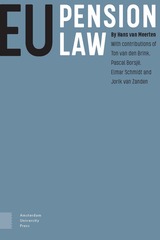
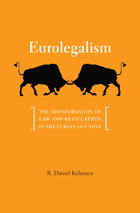
Despite western Europe's traditional disdain for the United States' "adversarial legalism," the European Union is shifting toward a very similar approach to the law, according to Daniel Kelemen. Coining the term "eurolegalism" to describe the hybrid that is now developing in Europe, he shows how the political and organizational realities of the EU make this shift inevitable.
The model of regulatory law that had long predominated in western Europe was more informal and cooperative than its American counterpart. It relied less on lawyers, courts, and private enforcement, and more on opaque networks of bureaucrats and other interests that developed and implemented regulatory policies in concert. European regulators chose flexible, informal means of achieving their objectives, and counted on the courts to challenge their decisions only rarely. Regulation through litigation-central to the U.S. model-was largely absent in Europe.
But that changed with the advent of the European Union. Kelemen argues that the EU's fragmented institutional structure and the priority it has put on market integration have generated political incentives and functional pressures that have moved EU policymakers to enact detailed, transparent, judicially enforceable rules-often framed as "rights"-and back them with public enforcement litigation as well as enhanced opportunities for private litigation by individuals, interest groups, and firms.
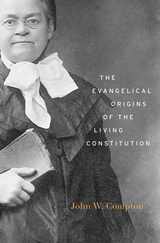
The New Deal is often said to represent a sea change in American constitutional history, overturning a century of precedent to permit an expanded federal government, increased regulation of the economy, and eroded property protections. John Compton offers a surprising revision of this familiar narrative, showing that nineteenth-century evangelical Protestants, not New Deal reformers, paved the way for the most important constitutional developments of the twentieth century.
Following the great religious revivals of the early 1800s, American evangelicals embarked on a crusade to eradicate immorality from national life by destroying the property that made it possible. Their cause represented a direct challenge to founding-era legal protections of sinful practices such as slavery, lottery gambling, and buying and selling liquor. Although evangelicals urged the judiciary to bend the rules of constitutional adjudication on behalf of moral reform, antebellum judges usually resisted their overtures. But after the Civil War, American jurists increasingly acquiesced in the destruction of property on moral grounds.
In the early twentieth century, Oliver Wendell Holmes and other critics of laissez-faire constitutionalism used the judiciary’s acceptance of evangelical moral values to demonstrate that conceptions of property rights and federalism were fluid, socially constructed, and subject to modification by democratic majorities. The result was a progressive constitutional regime—rooted in evangelical Protestantism—that would hold sway for the rest of the twentieth century.
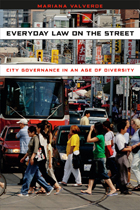
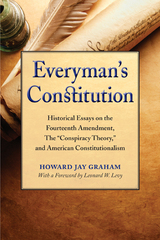

As a public defender, Allen Goodman faced cross-examination from family and friends every day: How could he work to help criminals? How could he live with himself? Presumed guilty by association, Goodman quickly learned that people didn’t really want an answer; they wanted a justification, perhaps even an apology. Ever the idealist, Goodman answered anyway: Everyone deserves justice.
Everyone against Us is Goodman’s testimony of his life as a public defender. In it, he documents his efforts to defend clients, both guilty and innocent, against routine police abuse, prosecutorial misconduct, and unjust sentencing. To work in criminal justice, Goodman shows, is to confront and combat vivid human suffering, of both victims and perpetrators. From sex trafficking, murder, and abuse to false conviction, torture, and systemic racism, Goodman describes the daily experiences that both rattled his worldview and motivated him to work ever harder. Part memoir, part exposé, Everyone against Us is the moving story of an embattled civil servant who staves off the worst abuses of the criminal justice system, at great personal cost.
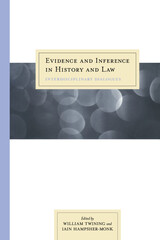
Coedited by Twining, one of the world's outstanding evidence scholars, and Iain Hampsher-Monk, a leading political theorist, the volume considers intriguing questions from Assyriology, theater iconography, musicology, criminology, the history of ideas, and colonial history as it reveals how particular concepts, lines of questioning, and techniques of reasoning and analysis developed in one context can be fruitfully applied in others. Did cuneiform languages really die out in the second or third century B.C.? Was Schubert responsible for any of the guitar arrangements for some of his lieder? In these cases and others, the authors' work demonstrates that, regardless of the field or the problem, all such projects involve drawing inferences from evidence, and that the logic of this kind of inquiry is always governed by the same principles.

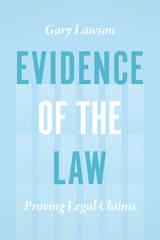
As Gary Lawson shows, legal claims are inherently objects of proof, and whether or not the law acknowledges the point openly, proof of legal claims is just a special case of the more general norms governing proof of any claim. As a result, similar principles of evidentiary admissibility, standards of proof, and burdens of proof operate, and must operate, in the background of claims about the law. This book brings these evidentiary principles for proving law out of the shadows so that they can be analyzed, clarified, and discussed. Viewing legal problems through this lens of proof illuminates debates about everything from constitutional interpretation to the role of stipulations in litigation. Rather than prescribe resolutions to any of those debates, Evidence of the Law instead provides a set of tools that can be used to make those debates more fruitful, whatever one’s substantive views may be. As lawyers, judges, and legal subjects confront uncertainty about what the law is, they can, should, and must, Lawson argues, be guided by the same kinds of abstract considerations, structures, and doctrines long used to make determinations about questions of fact.
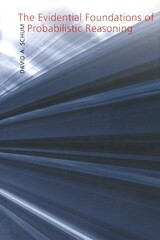
Synthesizing insights from law, philosophy and logic, probability, semiotics, artificial intelligence, psychology, and history, Schum provides a detailed examination of the various properties and uses of evidence and the evaluative skills evidence requires. Along with the evidential subtleties of probabilistic reasoning, Schum also explores the processes by which evidence is generated or discovered and looks at the intellectual and practical underpinnings of probabilistic reasoning. It is a useful resourse for students, researchers, and practitioners of every discipline concerned with evidence and its inferential use.
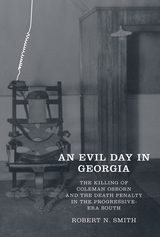
In An Evil Day in Georgia, author Robert Smith raises lingering questions about the
guilt of two men—one white and one black—executed for a murder in the Deep South
in the 1920s. . . . The telling of this story, one that played out in the Jim Crow era and the
days of bootlegging and the Ku Klux Klan, exposes the death penalty’s imperfections even
as it calls into question the veracity of a woman’s confession, later recanted, that
once brought her within a stone’s throw of the state’s electric chair.”
—John Bessler, author of Cruel and Unusual: The American Death Penalty
and the Founders’ Eighth Amendment
On the night of August 5, 1927, someone shot and killed Coleman Osborn, a store owner in
Chatsworth, Georgia, in his place of business. Police and neighbors found only circumstantial
traces of the murderer: tire tracks, boot prints, shell casings, and five dollars in cash near
Osborn’s body. That day, three individuals—James Hugh Moss, a black family man locally
renowned for his baseball skills; Clifford Thompson, Moss’s white friend who grew up in the
Smoky Mountains; and Eula Mae Thompson, Clifford’s wife and a woman with a troubling history
of failed marriages and minor run-ins with the law—left Etowah, Tennessee, unknowingly
on a collision course with Deep South justice.
In chilling detail, Robert N. Smith examines the circumstantial evidence and deeply flawed
judicial process that led to death sentences for Moss and the Thompsons. Moving hastily in the
wake of the crime, investigators determined from the outset that the Tennessee trio, well known
as bootleggers, were the culprits. Moss and Clifford Thompson were tried and convicted within a
month of the murder. Eula Mae was tried separately from the other two defendants in February
1928, and her sentence brought her notoriety and celebrity status. On the night of her husband’s
execution, she recanted her original story and would change it repeatedly in the following years.
As reporters from Atlanta and across Georgia descended on Murray County to cover the trials
and convictions, the public perception of Eula Mae changed from that of cold-blooded murderer
to victim—one worthy of certain benefits that suited her status as a white woman. Eula Mae
Thompson’s death sentence was commuted in 1928, thanks in part to numerous press interviews
and staged photos. She was released in 1936 but would not stay out of trouble for long.
An Evil Day in Georgia exposes the historic deficiencies in death penalty implementation
and questions, through its case study of the Osborn murder, whether justice can ever be truly
unbiased when capital punishment is inextricably linked to personal and political ambition and
to social and cultural values.
Robert N. Smith is an independent scholar living in Oxford, England.

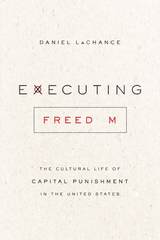
That question is at the heart of Executing Freedom, a powerful, wide-ranging examination of the place of the death penalty in American culture and how it has changed over the years. Drawing on an array of sources, including congressional hearings and campaign speeches, true crime classics like In Cold Blood, and films like Dead Man Walking, Daniel LaChance shows how attitudes toward the death penalty have reflected broader shifts in Americans’ thinking about the relationship between the individual and the state. Emerging from the height of 1970s disillusion, the simplicity and moral power of the death penalty became a potent symbol for many Americans of what government could do—and LaChance argues, fascinatingly, that it’s the very failure of capital punishment to live up to that mythology that could prove its eventual undoing in the United States.

Seventy-Five Years Ago, the Last American Soldier Who Paid the Ultimate Price for Desertion
A New Edition of the Acclaimed Investigative Story
In August 1944, a drab convoy of raw recruits destined to join the 28th Division lumbered along a windy French road strewn with dead animals, shattered bodies, and burning equipment. One of those draftees was 24-year-old Eddie Slovik, a petty thief from Detroit who had spent his youth in and out of reform schools. Eddie's luck had recently changed, however, with a steady factory job and marriage to a beautiful girl who gave Eddie hope and security for the first time in his life. But their honeymoon—like that of many other wartime newlyweds—was interrupted by the call to service. The convoy came under intense artillery fire, and in the confusion Slovik became separated from his unit. He joined a Canadian outfit and traveled with them before finally reporting to the 28th Division. He carried a rifle but no ammunition. He was assigned to a platoon but walked away. Refusing to kill, Slovik was arrested, court martialed, and condemned to death. Hundreds of soldiers were tried for desertion during World War II and sentenced to die, but only Eddie Slovik paid the price, supposedly as a deterrent, yet word of the nature of his death was never officially released to the public.
In The Execution of Private Slovik, considered to be among the best investigative books ever written, journalist and author William Bradford Huie reconstructs this entire story with the full cooperation of the U.S. Army in order to find out what made Eddie Slovik an unlikely pacifist and why the affair was covered up. Through interviews with those who knew him and the hundreds of letters to his wife, the author reveals a hard luck depression-era kid who when faced with the reality of war realized that he simply could not kill another human being. Throughout, Huie reveals how Eddie Slovik's death has much to tell us about life and duty to one's country. This edition marking the seventy-fifth anniversary of the sentence being carried out, contains a new introduction by the author's daughter.
Praise for The Execution of Private Slovik:
"In the hands of an expert, who writes both passionately and with an almost transparent effort to be fair to all concerned, the story raises questions to which our wisest leaders still lack satisfying answers."
—New York Times
"A remarkable story reported by a master."—W. E. B. Griffin
"Recommended reading for all military historians."—Military Affairs
"Tremendously moving."—The Atlantic
"It is very likely that William Bradford Huie's The Execution of Private Slovikwill long survive the official histories of World War II. It is a big book and Mr. Huie deserves some sort of rich reward for this unburying of an incident of the war which must disturb us all. For Slovik was more than a 'coward.' He not only did not want to die but he did not want to kill, and one must look far in literature for a figure so moving as Private Slovik wandering about Europe not with bullets in his cartridge belt but with writing paper. The question is not 'How might we improve military procedures?' The question is, 'What has happened to love in our world when he who would rather love than kill must die?'"—from a letter to the New York Times

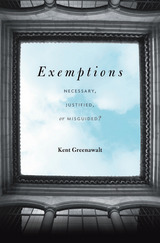
Should laws apply equally to everyone, or should some individuals and organizations be granted exemptions because of conflicting religious or moral convictions? In recent years, this question has become intensely controversial in America. The Supreme Court’s ruling on same-sex marriage, in particular, has provoked barbed debates about legal exemptions. At the core of these debates lies the question of whether basic values of equality and nondiscrimination are at odds with the right to live according to one’s religious beliefs.
In Exemptions: Necessary, Justified, or Misguided? Kent Greenawalt draws on his extensive expertise to place same-sex marriage and other controversies within a broader context. Avoiding oversimplification and reflecting a balanced consideration of competing claims and harms, he offers a useful overview of various types of exemptions and the factors that we should take into account when determining the justice of a particular exemption.
Through a close study of several cases, from doctors who will not perform abortions to institutions that do not pay taxes, Greenawalt demonstrates how to weigh competing values without losing sight of practical considerations like the difficulty of implementing a specific law. This thoughtful guide to exemptions will prove an invaluable resource as America struggles to come to terms with Obergefell v. Hodges, Burwell v. Hobby Lobby, and similar controversies. Exemptions shows how to reach the most just and desirable legal conclusions by respecting those who wish to live according to different fundamental values.

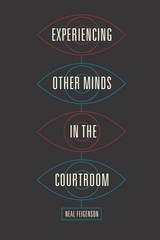
In Experiencing Other Minds in the Courtroom, Neal Feigenson turns the courtroom into a forum for exploring the profound philosophical, psychological, and legal ramifications of our efforts to know what other people’s conscious experiences are truly like. Drawing on disciplines ranging from cognitive psychology to psychophysics to media studies, Feigenson harnesses real examples of digitally simulated subjective perceptions to explain how the epistemological value of this evidence is affected by who creates it, how it is made, and how it is presented. Through his close scrutiny of the different kinds of simulations and the different knowledge claims they make, Feigenson is able to suggest best practices for how we might responsibly incorporate such evidence into the courtroom.

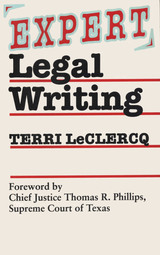
For many years, Terri LeClercq's "Legal Writing" column in the Texas Bar Journal helped polish the prose of lawyers and law students, judges and clerks, paralegals, writing instructors, and legal secretaries. This book collects all the advice she has given in her columns into one authoritative guide for expert legal writing. LeClercq covers everything a legal writer needs to know, from the mechanics of grammar and punctuation to the finer points of style, organization, and clarity of meaning. With her practical, readable, and often humorous advice, those who prepare legal documents can rid their prose of mind-numbing "legalese" and write with the clarity and precision that characterize the very best legal writing.
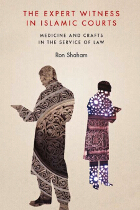
Shaham begins with a history of expert testimony in medieval Islamic culture, analyzing the different roles played by male experts, especially physicians and architects, and females, particularly midwives. From there, he focuses on the case of Egypt, tracing the country’s reform of its traditional legal system along European lines beginning in the late nineteenth century. Returning to a broader perspective, Shaham draws on a variety of legal and historical sources to place the phenomenon of expert testimony in cultural context. A truly comprehensive resource, The Expert Witness in Islamic Courts will be sought out by a broad spectrum of scholars working in history, religion, gender studies, and law.
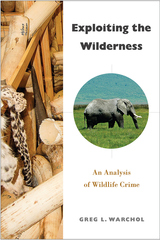
Illegally harvested ivory and endangered plants, mammals, reptiles, birds, and even insects are easily found for sale throughout East and Southern Africa. And this is just one part of the multi-billion-dollar illegal global trade in wildlife.
Wildlife is an important and even vital asset for both intrinsic and economic reasons. Yet it is illegally exploited on a massive scale to the point where some species now risk extinction. Exploiting the Wilderness provides a concise overview of this shameful business, describing some of the main species being exploited and examining select wildlife whose survival is imperiled due to heavy pressure from poachers to meet consumer demand.
Greg Warchol draws on his firsthand experience and research in Africa to examine the structure and operation of the illegal trade in wildlife. He identifies the participants as well as their motivations and operations, and explains the behavior of poachers, traffickers, and consumers of illegally obtained goods. He concludes with a description of legislative and law enforcement efforts to control and prevent wildlife exploitation along with a number of contemporary conservation initiatives designed to improve the ability of rangers to protect wildlife.

The contributors discuss the role and function of export control policies from a variety of perspectives—security, commerce, diplomacy, the European region, and that of the newly industrialized countries. Among the topics covered are the problems the United States and the Western export regime will face in the 1990s in light of changing international political alliances and dependencies, in defining strategic exports, in enforcing export controls, and the role of the Coordinating Committee for Multilateral Export Controls.
Contributors. Sumner Benson, Beverly Crawford, Richard t. Cupitt, Dorinda G. Dallmeyer, Paul Freedenberg, Martin J. Hillenbrand, Hanns-Dieter Jacobsen, Bruce W. Jentleson, Kevin J. Lasher, William J. Long, Janne Haaland Matlary, Jere W. Morehead, Henry R. Nau, Han S. Park, Kevin F. F. Quigley, Alen B. Sherr, Christine Westbrook
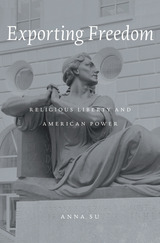
Religious freedom is widely recognized today as a basic human right, guaranteed by nearly all national constitutions. Exporting Freedom charts the rise of religious freedom as an ideal firmly enshrined in international law and shows how America’s promotion of the cause of individuals worldwide to freely practice their faith advanced its ascent as a global power.
Anna Su traces America’s exportation of religious freedom in various laws and policies enacted over the course of the twentieth century, in diverse locations and under a variety of historical circumstances. Influenced by growing religious tolerance at home and inspired by a belief in the United States’ obligation to protect the persecuted beyond its borders, American officials drafted constitutions as part of military occupations—in the Philippines after the Spanish-American War, in Japan following World War II, and in Iraq after 2003. They also spearheaded efforts to reform the international legal order by pursuing Wilsonian principles in the League of Nations, drafting the United Nations Charter, and signing the Helsinki Accords during the Cold War. The fruits of these labors are evident in the religious freedom provisions in international legal instruments, regional human rights conventions, and national constitutions.
In examining the evolution of religious freedom from an expression of the civilizing impulse to the democratization of states and, finally, through the promotion of human rights, Su offers a new understanding of the significance of religion in international relations.

A sharp exposé of the roots of the cost-exposure consensus in American health care that shows how the next wave of reform can secure real access and efficiency.
The toxic battle over how to reshape American health care has overshadowed the underlying bipartisan agreement that health insurance coverage should be incomplete. Both Democrats and Republicans expect patients to bear a substantial portion of health care costs through deductibles, copayments, and coinsurance. In theory this strategy empowers patients to make cost-benefit tradeoffs, encourages thrift and efficiency in a system rife with waste, and defends against the moral hazard that can arise from insurance. But in fact, as Christopher T. Robertson reveals, this cost-exposure consensus keeps people from valuable care, causes widespread anxiety, and drives many patients and their families into bankruptcy and foreclosure.
Marshalling a decade of research, Exposed offers an alternative framework that takes us back to the core purpose of insurance: pooling resources to provide individuals access to care that would otherwise be unaffordable. Robertson shows how the cost-exposure consensus has changed the meaning and experience of health care and exchanged one form of moral hazard for another. He also provides avenues of reform. If cost exposure remains a primary strategy, physicians, hospitals, and other providers must be held legally responsible for communicating those costs to patients, and insurance companies should scale cost exposure to individuals’ ability to pay.
New and more promising models are on the horizon, if only we would let go our misguided embrace of incomplete insurance.
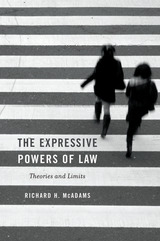
When asked why people obey the law, legal scholars usually give two answers. Law deters illicit activities by specifying sanctions, and it possesses legitimate authority in the eyes of society. Richard McAdams shifts the prism on this familiar question to offer another compelling explanation of how the law creates compliance: through its expressive power to coordinate our behavior and inform our beliefs.
“McAdams’s account is useful, powerful, and—a rarity in legal theory—concrete…McAdams’s treatment reveals important insights into how rational agents reason and interact both with one another and with the law. The Expressive Powers of Law is a valuable contribution to our understanding of these interactions.”
—Harvard Law Review
“McAdams’s analysis widening the perspective of our understanding of why people comply with the law should be welcomed by those interested either in the nature of law, the function of law, or both…McAdams shows how law sometimes works by a power of suggestion. His varied examples are fascinating for their capacity both to demonstrate and to show the limits of law’s expressive power.”
—Patrick McKinley Brennan, Review of Metaphysics

Every year hundreds of defendants are convicted on little more than the say-so of a fellow citizen. Although psychologists have suspected for decades that an eyewitness can be highly unreliable, new evidence leaves no doubt that juries vastly overestimate the credibility of eyewitness accounts. It is a problem that the courts have yet to solve or face squarely.
In Eyewitness Testimony, Elizabeth Loftus makes the psychological case against the eyewitness. Beginning with the basics of eyewitness fallibility, such as poor viewing conditions, brief exposure, and stress, Loftus moves to more subtle factors, such as expectations, biases, and personal stereotypes, all of which can intervene to create erroneous reports. Loftus also shows that eyewitness memory is chronically inaccurate in surprising ways. An ingenious series of experiments reveals that memory can be radically altered by the way an eyewitness is questioned after the fact. New memories can be implanted and old ones unconsciously altered under interrogation.
These results have important implications for court reform, police interrogation methods, defense strategy, and many other aspects of criminal and civil procedure. Eyewitness Testimony is a powerful book that should be required reading for trial lawyers, social psychologists, and anyone who considers the chilling prospect of confronting an eyewitness accusation in a court of law.

Every year hundreds of defendants are convicted on little more than the say-so of a fellow citizen. Although psychologists have suspected for decades that an eyewitness can be highly unreliable, new evidence leaves no doubt that juries vastly overestimate the credibility of eyewitness accounts. It is a problem that the courts have yet to solve or face squarely.
In Eyewitness Testimony, Elizabeth Loftus makes the psychological case against the eyewitness. Beginning with the basics of eyewitness fallibility, such as poor viewing conditions, brief exposure, and stress, Loftus moves to more subtle factors, such as expectations, biases, and personal stereotypes, all of which can intervene to create erroneous reports. Loftus also shows that eyewitness memory is chronically inaccurate in surprising ways. An ingenious series of experiments reveals that memory can be radically altered by the way an eyewitness is questioned after the fact. New memories can be implanted and old ones unconsciously altered under interrogation.
These results have important implications for court reform, police interrogation methods, defense strategy, and many other aspects of criminal and civil procedure. Eyewitness Testimony is a powerful book that should be required reading for trial lawyers, social psychologists, and anyone who considers the chilling prospect of confronting an eyewitness accusation in a court of law.
READERS
Browse our collection.
PUBLISHERS
See BiblioVault's publisher services.
STUDENT SERVICES
Files for college accessibility offices.
UChicago Accessibility Resources
home | accessibility | search | about | contact us
BiblioVault ® 2001 - 2024
The University of Chicago Press









